As a boat enthusiast, you know the impact your beloved hobby can have on the environment. That’s where the “The Best Environmentally-friendly Boat Engine Options” comes in. This informative article is armed with detailed insights concerning the most sustainable boat engine options available. By offering you a comprehensive look at eco-friendly engines – whether that’s electric, hybrid, or biodiesel ones – it empowers you to make informed decisions when choosing your next boat engine. Balancing between your passion for boating and your responsibility towards the environment has never been easier!
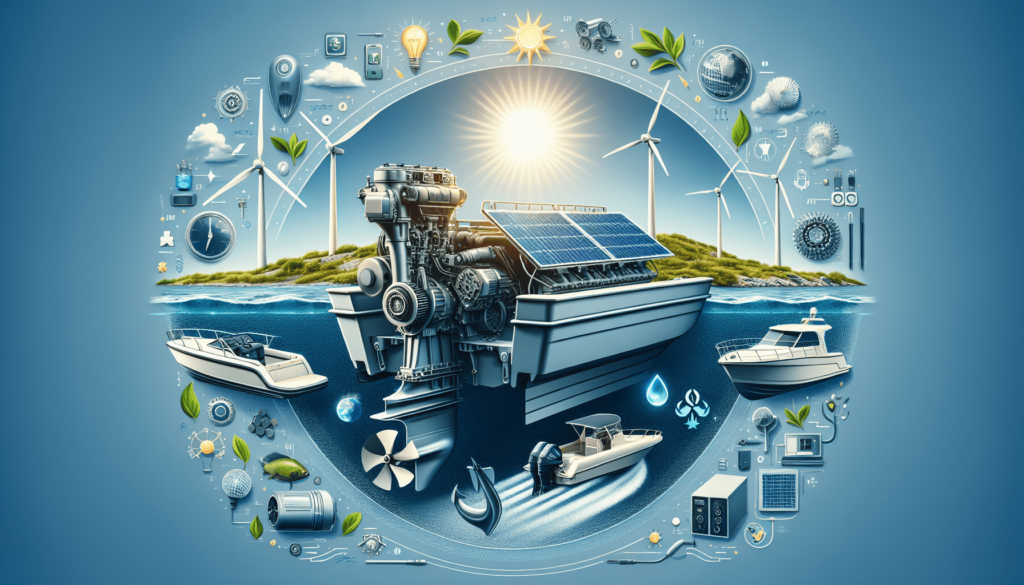
Hybrid Engine Options
In the quest for greener alternatives, hybrid engines for boats have become increasingly popular. If you’re looking for a boat that seamlessly combines traditional power sources with advanced technology, hybrid engines are a great choice.
Understanding hybrids combines power sources
Hybrid engine options combine energy production from two different sources – typically a traditional internal combustion engine and an electric motor. The idea is to leverage the strengths and minimize the weaknesses of both types of power sources, thus improving fuel efficiency and reducing emissions.
Types of hybrid engines available for boats
Several hybrid engines are available currently for boats. Some models use diesel-electric or gasoline-electric combinations, while others introduce propane or biofuel alternatives. Each option has its own unique advantages and challenges, so it’s crucial you consider your specific needs and circumstances before deciding.
Comparing the efficiency of hybrid vs. traditional engines
While traditional boating engines rely solely on one source of power, hybrid engines can switch between different sources, thereby enhancing their efficiency. This versatility means they can leverage the most efficient power source based on various circumstances, like cruising speed or load capacity, hence saving fuel and reducing emissions.
Electric Boat Engines
If you’re considering a move away from fossil fuels, electric boat engines are a prime choice.
Understanding electric boat engines
Electric boat engines are just what they sound like, engines that run on electric power sources. They’re powered by a battery that can be recharged through different ways, such as using power from the grid, a generator, or renewable sources such as solar.
Benefits of using an electric boat engine
Electric boat engines offer a range of advantages over traditional power options. They are quieter, need less maintenance, and emit less pollution. Plus, electricity is typically cheaper than fossil fuels, making electric engines a cost-effective long-term investment.
Charging and power storage for electric boat engines
Charging an electric boat engine is similar to charging an electric car, it can be accomplished through a standard power outlet, or a specialized charging station for quicker power-ups. Storing energy, however, can be challenging, as batteries can be heavy and also require significant space.
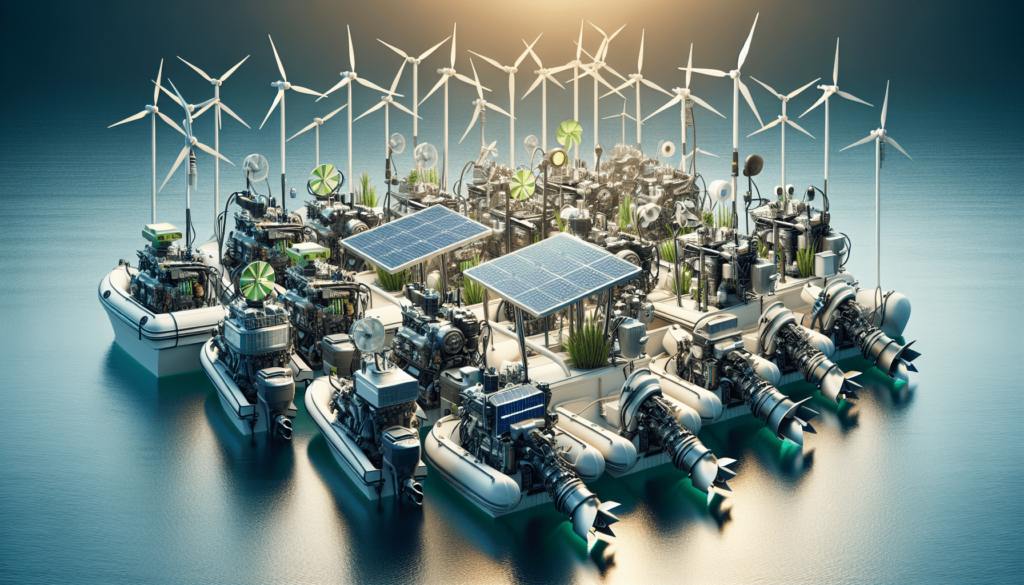
Bio-Diesel Engines
bio-diesel engines are also a viable eco-friendly option for your boat.
Definition and working mechanism of bio-diesel engines
Essentially, bio-diesel engines can use either conventional petroleum diesel or diesel derived from biological sources like vegetable oils or animal fats. It generally requires little to no modification to the engine itself.
Comparing bio-diesel engines with conventional diesel engines
While bio-diesel and conventional diesel engines operate similarly, their fuel sources are vastly different. Bio-diesel is renewable and less environmentally damaging, whereas conventional diesel is a finite resource and emits harmful pollutants.
The environmental impact of using bio-diesel engines
Bio-diesel engines are not completely emission-free, but the fact that bio-diesel is derived from renewable sources plays a big part in reducing their environmental footprint. Plus, it helps in diminishing our reliance on fossil fuels.
Propane Boat Engines
A propane boat engine is another alternative to consider if you’re looking to do your bit for the environment.
Overview of Propane engines
A propane boat engine uses propane gas, stored in pressurized tanks, as its fuel source. The engine itself is similar to a gasoline engine, but with modified parts to handle propane fuel.
Environmental benefits of using Propane as boat fuel
Propane produces fewer emissions than conventional fuels like gasoline or diesel. It burns cleaner and produces fewer greenhouse gases, which makes it a more environmentally-friendly choice.
Concerns and considerations for using Propane engines
Despite the many benefits of propane, there are also some issues to bear in mind. Propane tanks can be bulkier and heavier than gasoline or diesel fuel tanks and refuelling can be harder as propane fill stations are less common.
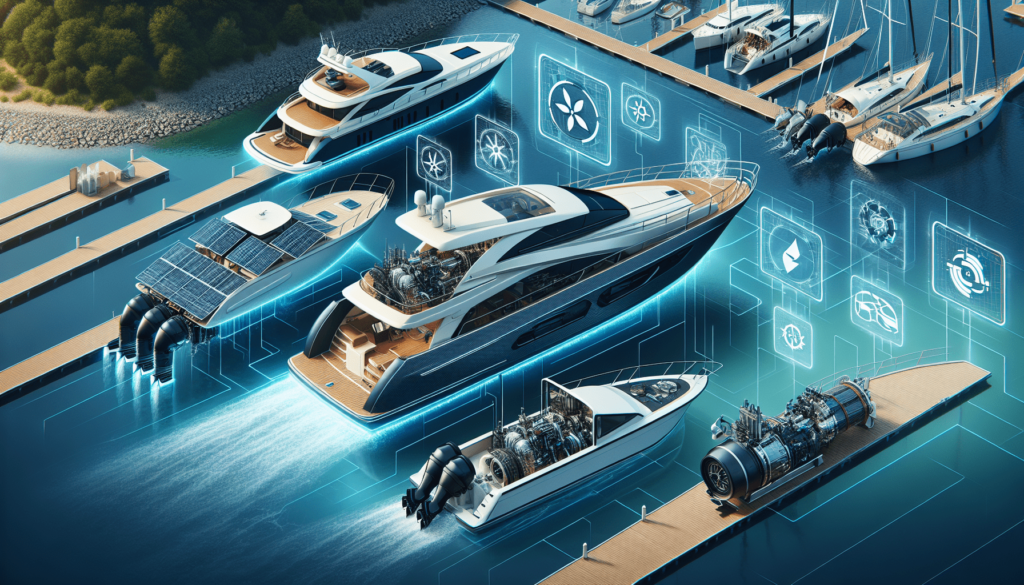
Solar Boat Engines
Solar boats are increasingly common and harness the power of the sun to propel them.
Understanding solar boat engines
A solar boat engine uses photovoltaic panels to capture solar energy and convert it into electrical power. This power is then stored in a battery that powers the boat’s electric motor.
Advantages of using solar power for boats
The most obvious advantage of using solar power for boats is that it’s renewable and clean. It also provides a quiet and peaceful ride and is cost-effective over time as the sun’s energy is free.
Challenges associated with solar boat engines
While solar engines are incredibly eco-friendly, they also come with some challenges. For one, they are dependent on good weather conditions and may require supplementary power sources on cloudy days or at night. Also, the power output is not as high as traditional or other alternative fuels, potentially limiting speed and range.
Hydrogen Fuel Cells
Another innovative power option for boats is hydrogen fuel cells.
Working mechanism of hydrogen fuel cells
Hydrogen fuel cells work by converting chemical energy from hydrogen into electricity. Unlike conventional combustion-based technologies, they produce power with negligible emissions and noise, making them an ideal choice for boats.
Environmental benefits and sustainability of hydrogen fuel cells
One of the main benefits of hydrogen fuel cells is they only emit water vapor, making them an extremely clean energy source. Additionally, as hydrogen is the most abundant element in the universe, it provides a near-limitless source of fuel.
Applications of hydrogen fuel cells in boats
While still relatively new, there are several boats already successfully using hydrogen fuel cells. However, as the technology is still being developed and improved, initial costs may be higher than more established alternatives.
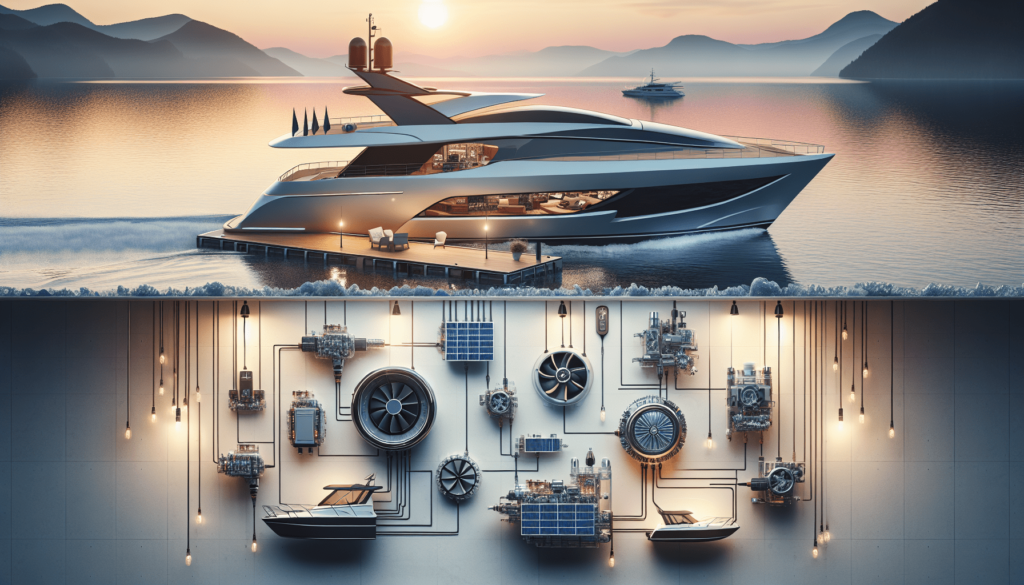
Nuclear Powered Engines
You might be surprised to learn that nuclear power is also a possibility for boats, albeit currently limited to large vessels and submarines.
The principle of nuclear powered engines
Nuclear-powered engines operate by harnessing the energy released by nuclear reactions to generate steam, which drives the boat’s turbines.
The potential benefits and drawbacks of nuclear powered boat engines
Nuclear engines have the advantage of incredibly long endurance and high power output. However, they also have significant drawbacks, most notably the risk of nuclear accidents and the disposal of radioactive waste.
Safety considerations for nuclear powered boats
Given the potential risk associated with nuclear power, strict safety measures and regulations are in place. These include robust containment systems and carefully controlled operation procedures.
Wind Power
A traditional yet renewable source of power, wind power is also an alternative to consider.
Overview of using wind power for boats
Wind power harkens back to the earliest days of sailing. Today’s wind-powered boats incorporate modern materials and technologies to enhance efficiency and performance.
Advantages and drawbacks of wind-powered boats
Wind-powered boats emit zero emissions and are absolutely silent. The wind is free and unlimited, making it an ideal power source. However, like solar power, it’s dependent on weather conditions and might require a backup power source just in case.
Technological innovations enhancing the efficiency of wind-powered boats
The use of the wind as a power source for boats has been revitalized by advancements in materials, aerodynamics, and technology. Modern sailing rigs and hull designs, along with electronic control systems, contribute to more efficient, speedy, and enjoyable sailing.
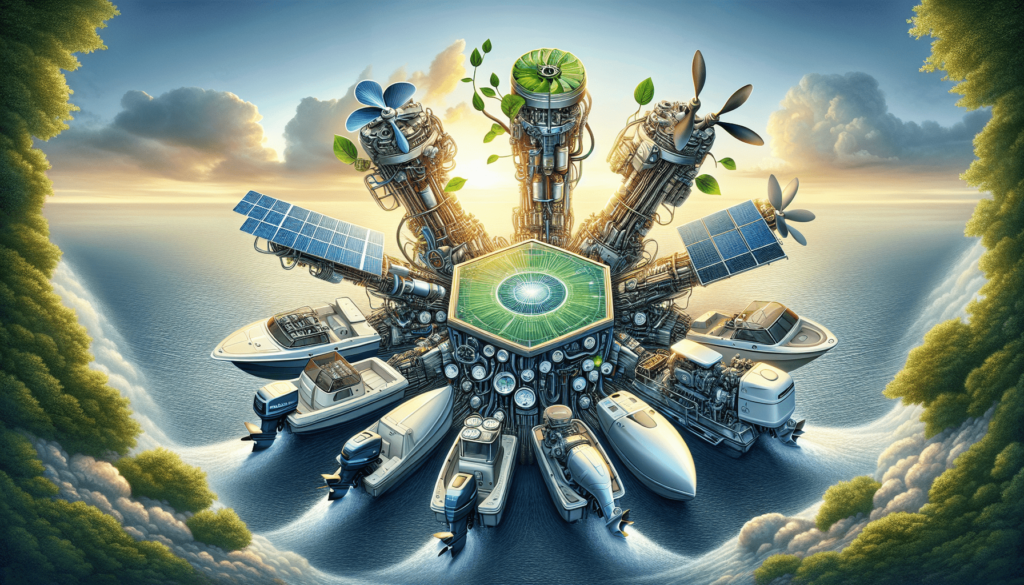
Kinetic Water Energy Generation
This innovative and eco-friendly power option for boats deserves your attention.
Understanding kinetic water energy generation
Kinetic water energy generation involves capturing the energy generated by the movement of water. In the context of boats, this can be the water displaced by the boat’s movement or the current the boat moves against.
Approaches to harnessing this energy for boat propulsion
Devices such as turbines or propellers can be used to capture and convert this kinetic energy into electric power which can be utilized for boat propulsion.
Environmental impact of kinetic water energy generation
One key advantage of kinetic water energy generation is its negligible impact on the environment since it harnesses naturally occurring energy. However, care must be taken to design and implement systems that don’t interfere with marine life or ecosystems.
Comparing Boat Engine Options
With so many options at your disposal, choosing the right one can be tricky.
Comparative analysis of different boat engine types
Each type of boat engine has its own unique capabilities and benefits. For instance, nuclear and hydrogen power offer high performance and endurance, but they also have significant challenges. On the other hand, solar, wind and kinetic energy options are more environmentally friendly, but also have limitations regarding availability and power output.
Considerations for choosing an eco-friendly boat engine
Some factors you might want to consider while choosing an eco-friendly boat engine include your boating needs (such as range, speed, and capacity), initial investment and long-term operating costs, and essential considerations like environmental impact and sustainability.
Future trends in environmentally-friendly boat engine technology
As environmental consciousness continues to grow, so does the field of eco-friendly boat engines. Future trends may include more efficient solar cells and wind systems, improved storage for electric power, and advancements in bio-diesel and hydrogen fuel technologies. Irrespective of the path we take, it’s clear that the future of boating is green and sustainable.

